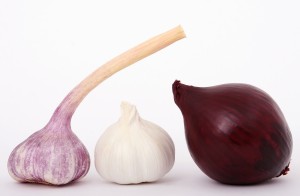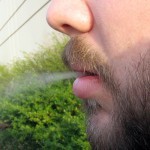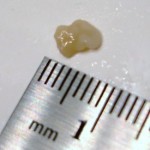Bad Breath
 Sometimes I feel bad for onions and garlic. Lots of people eat them and enjoy them. Then, after a few minutes they notice that their breath stinks.
Sometimes I feel bad for onions and garlic. Lots of people eat them and enjoy them. Then, after a few minutes they notice that their breath stinks.
Who gets blamed for their bad breath? The onions and garlic. In fact, when some people think of bad breath, they get an image of an old gray-haired witch stirring a boiling cauldron of onion and garlic stew. That seems a bit unfair.
Just to be clear, I'm not saying that garlic and onions don't cause bad breath. I just want you to know that there are many other causes of bad breath besides onions and garlic.
Here's eight of them:
Eight Causes of Bad Breath
- Oral Bacteria Waste Products
- Foods
- Stomach Problems
- Your Tonsils
- Menstruation
- Drugs
- Dry Mouth
- Gingivitis and Periodontitis
Oral Bacteria Waste Products
Oral bacteria is the most common cause of bad breath. It can hide in places that you normally can't reach with a toothbrush, like below the gumline, between your teeth, in the very back of your mouth, and on the tongue.
Even if you brush your teeth a couple of times each day and floss, you can never completely remove all of the bacteria from your mouth. As you eat food, the bacteria break it down into waste products. These waste products can smell really bad. The worst ones are known as volatile sulfur compounds. These compounds are called volatile because they evaporate quickly and find their way out of your mouth by stinking up your breath.
These compounds can give your breath that "rotten egg" smell and other unpleasant odors such as a rotten meat smell, a fecal matter odor, and a cadaver-like smell.
Foods
As mentioned in the opening paragraph, garlic and onions do play a role in bad breath. They contain unpleasant-smelling compounds that are able to evaporate
quickly in your mouth. Because they evaporate quickly, they are released in your breath. There are many other foods that can cause bad breath. If the food has a strong odor, or it is spicy, then chances are that it can be a culprit in your bad breath.
Foods that are high in protein such as eggs, milk, and cheese have been linked to bad breath as well.
Stomach Problems
H. Pylori, which is the scientific name for the bug that causes stomach ulcers has been implicated in bad breath. A study published in 2002 found that the presence of H. pylori showed an increase in the strength of that person's bad breath. While this has been shown to be associated, it has not yet been proven.
Another example of a stomach problem associated with bad breath could be that when we digest food, it smells pretty bad. If someone is producing gas in their stomach, one of the main ways for it to leave is through the mouth. If you've ever been talking to someone that burped, you know how bad it can be!
Your Tonsils
Normally, your tonsils provide a good defense against harmful bacteria that enter in your mouth. Occasionally, there is too much to handle, and your tonsils form a calcified white cheese-like substance called a tonsillolith that smells horrible! Tonsilloliths are made up of decaying matter that your tonsil has been fighting.
If you've ever felt like you had something lodged in the back of your mouth, and you finally coughed up a smelly whitish substance, chances are it was a tonsillolith.
Menstruation
Many women notice that they get bad breath only during their menstrual period. This is very common and it is nothing to be worried about.
During menstruation, hormones alter the gums and other tissues in the mouth making them friendlier to bad breath-causing bacteria. Pregnant women may also notice bad breath due to these hormonal changes.
Drugs
Drugs such as cigarettes can cause bad breath by drying out your mouth and altering the bacteria that grow. It can also give your breath an old, stale smell.
Alcohol can give your breath that easily recognizable, pungent odor.
There are also a number of prescription drugs that can turn off the nerves that go to your salivary glands. These drugs can dry your mouth out fairly quickly, which leads to bad breath (see below.)
Dry Mouth
Dry mouth seems to cause bad breath by allowing only certain bacteria — the ones that cause bad breath — to grow more in your mouth. This is a major factor in morning breath. If you are unable to breathe through your nose at night due to a cold or sinusitis, your mouth quickly dries out and becomes a breeding ground for those bad breath-causing bacteria.
There are many other activities that will cause your mouth to get dry. Activities such as giving lectures, making sales calls, or just talking a lot with a friend can all dry your mouth out. To fix this, it is a good idea to have some water with you, or if that's not possible, some chewing gum can stimulate salivary flow to moisten your mouth.
Gingivitis and Periodontitis
Although this is principally caused by bacteria, I put it in a category of its own because in a healthy individual, there's not nearly as much room for bacteria to grow in the space between your teeth and gums.
When oral bacteria multiply below the tooth surface in your gums, gingivitis can occur. If gingivitis is not reversed, you can start to lose bone which will eventually lead to tooth loss. As the space between your gums and teeth get bigger, it can turn into a vacation home for the bacteria that cause bad breath.







